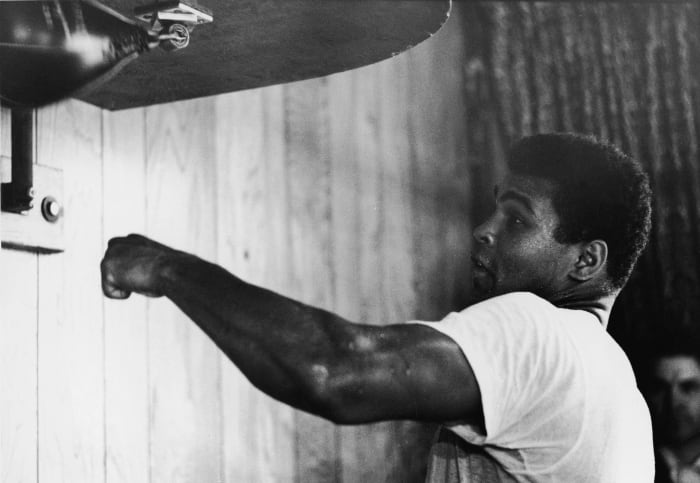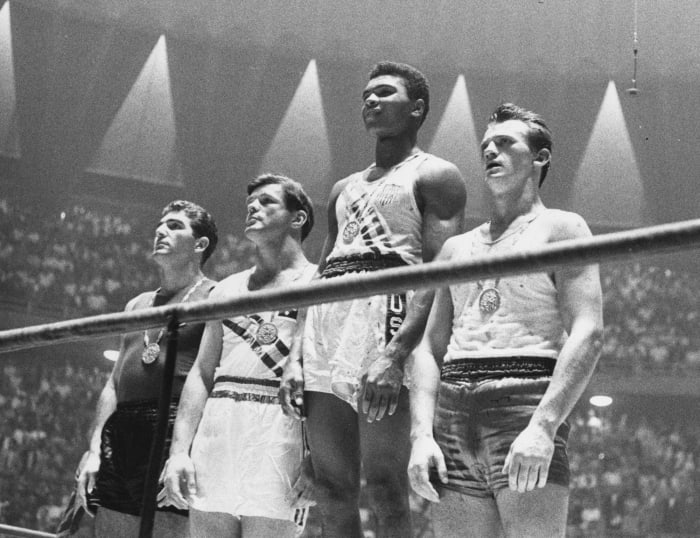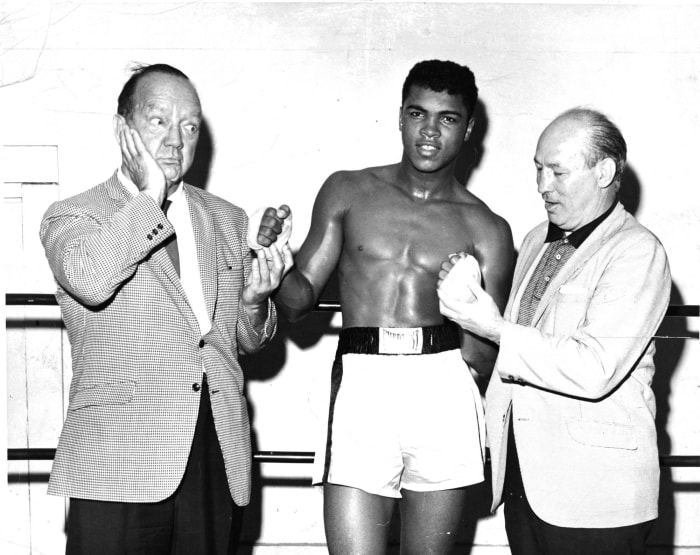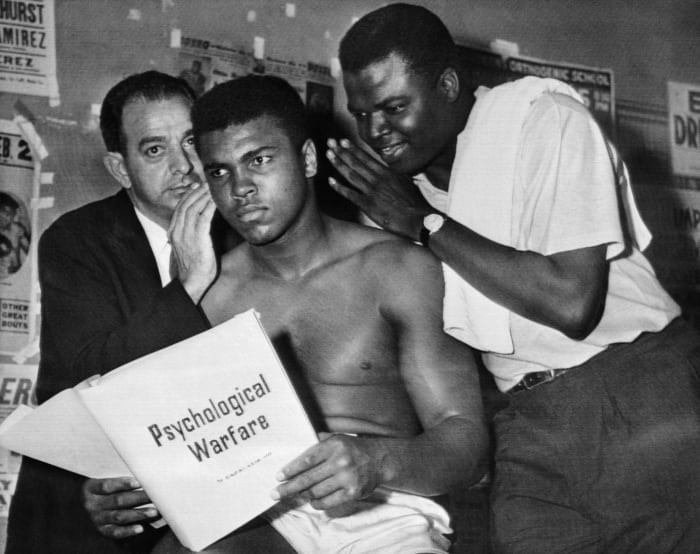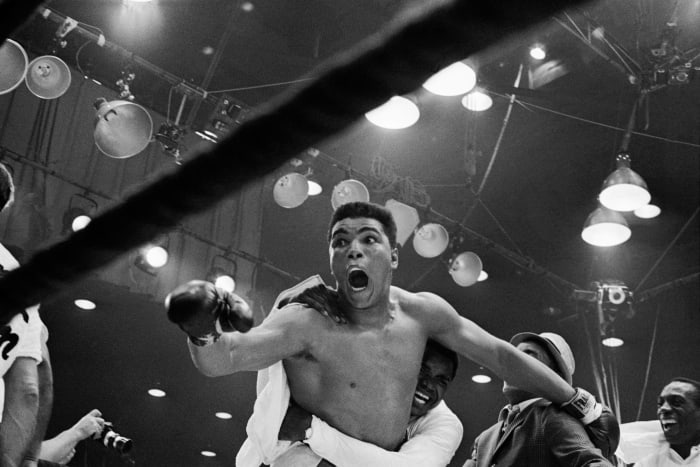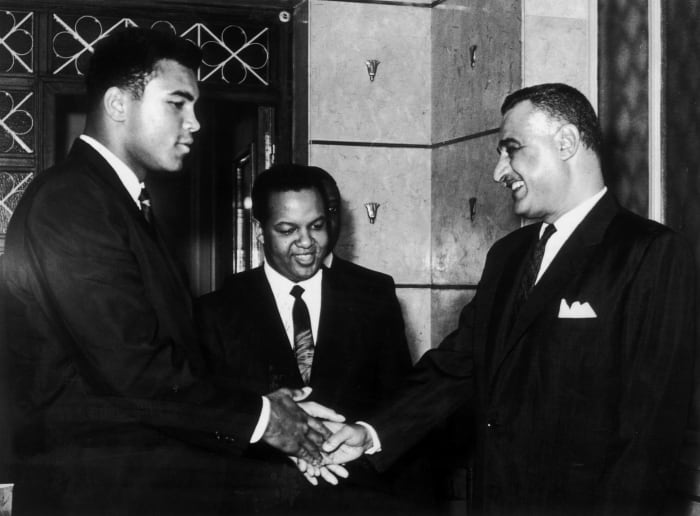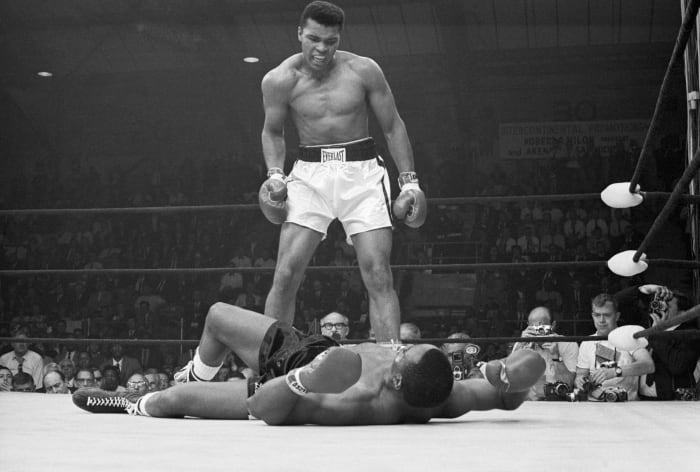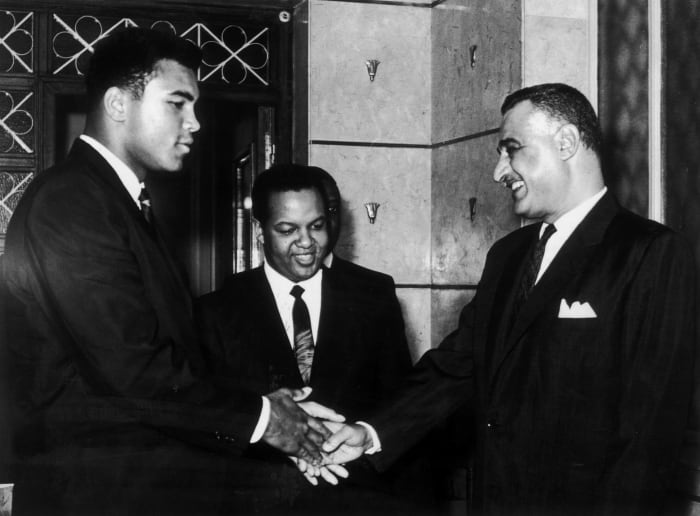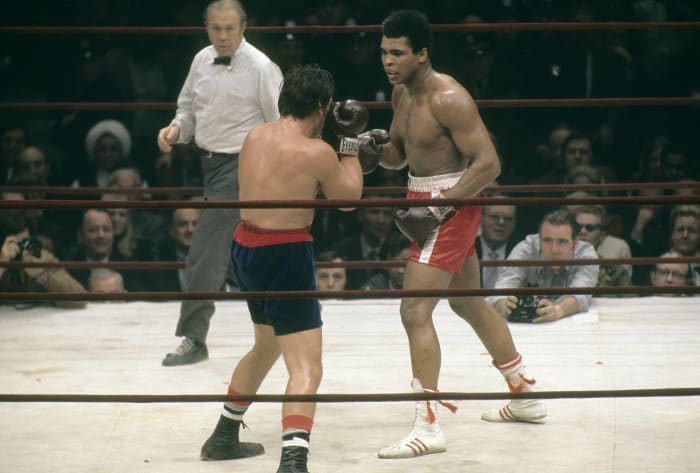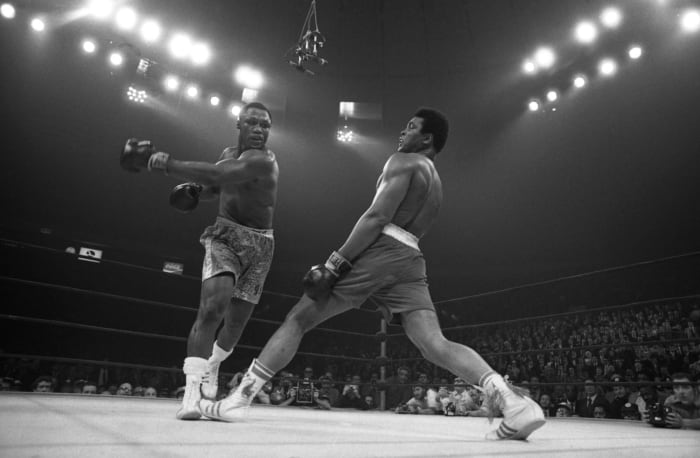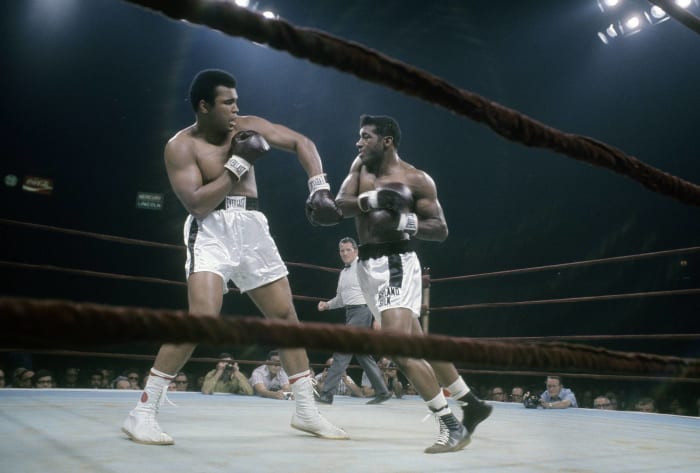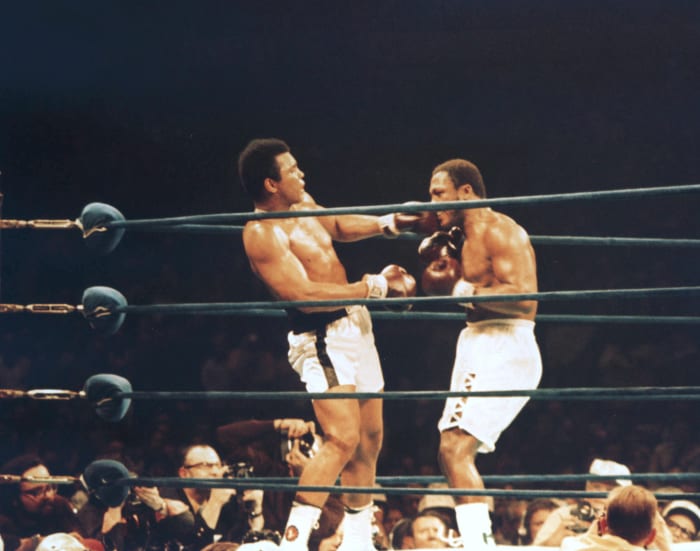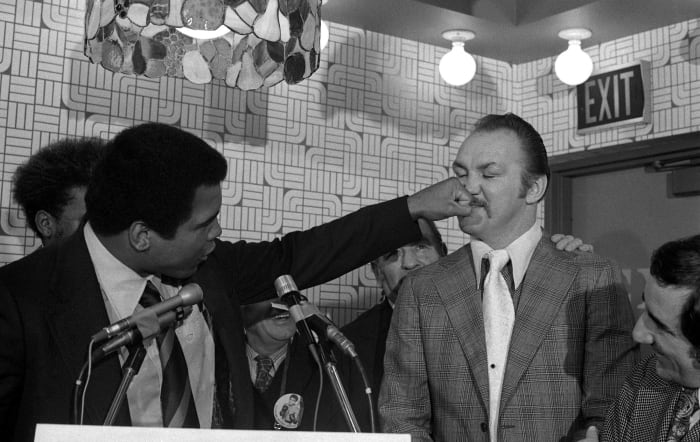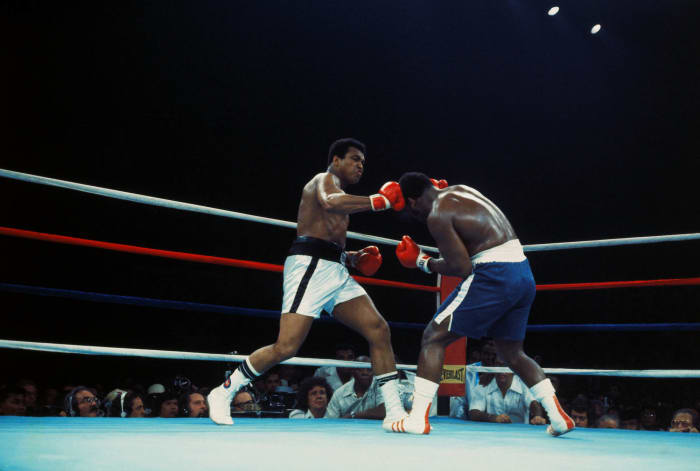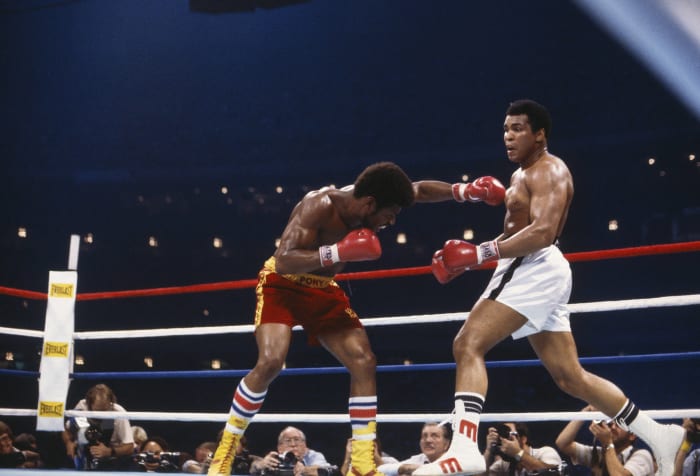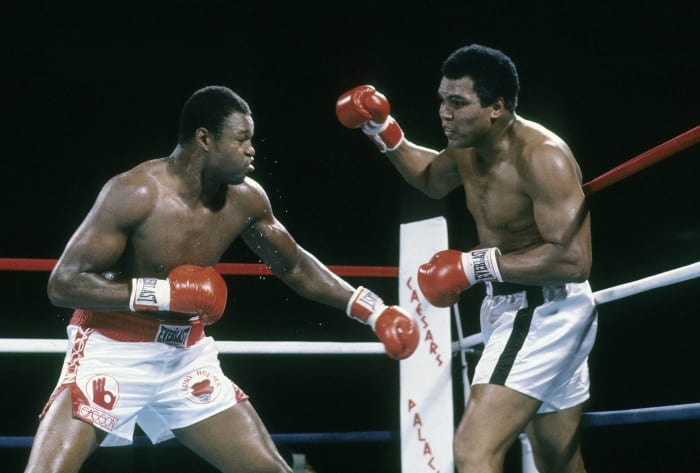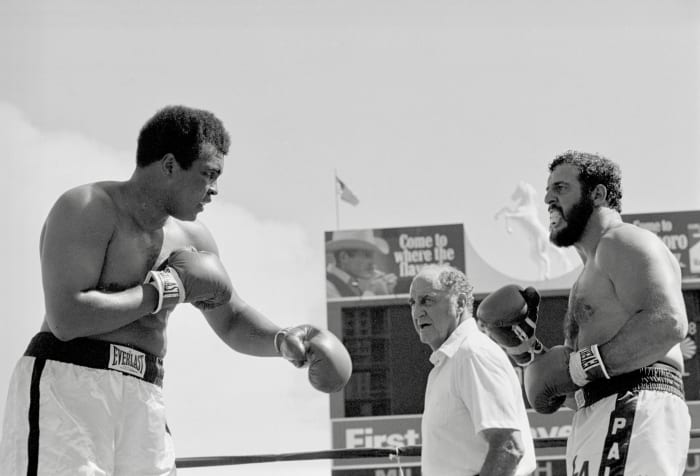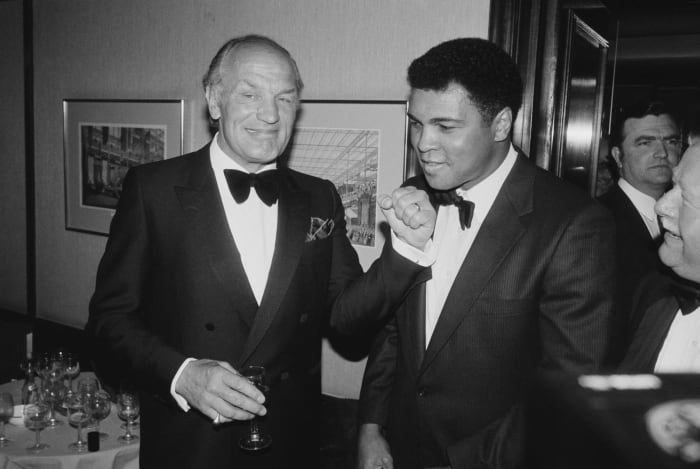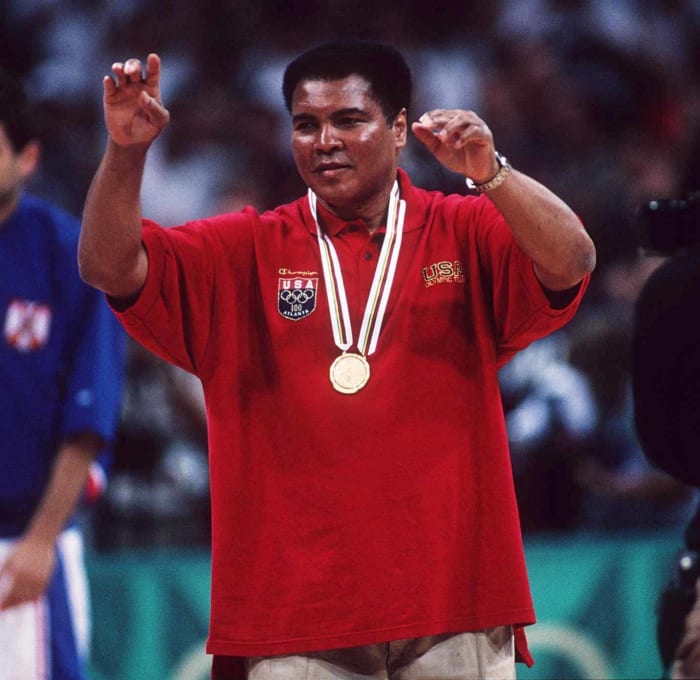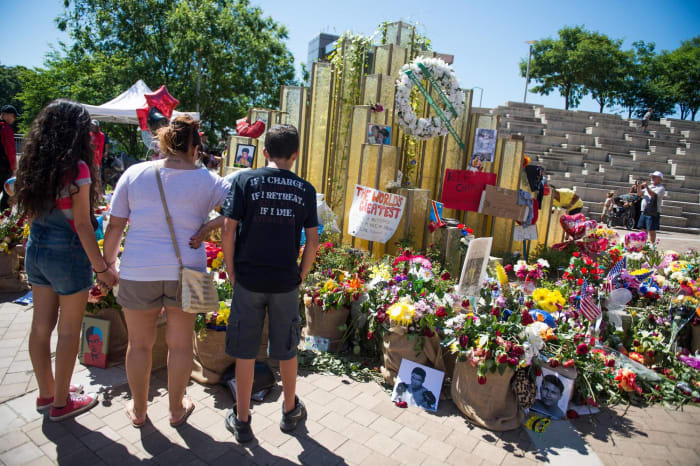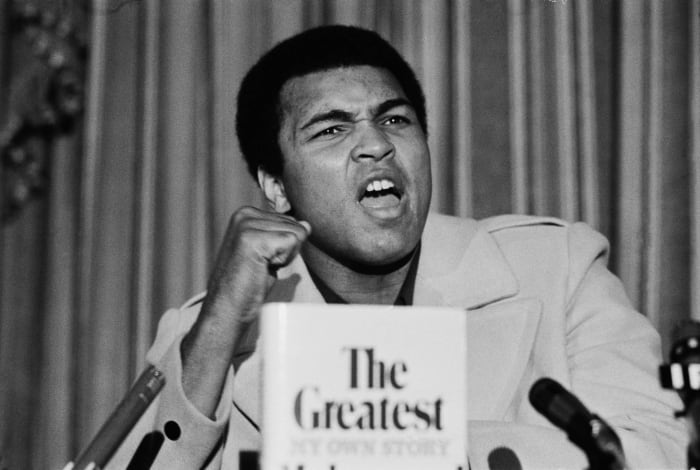When you are talking boxing greats, Muhammad Ali is one of the first names destined to come up. He’s a legend of the sport and a legend of sports in general. There was a time when Ali was probably the biggest athlete in the world. He was a true celebrity with a lasting cultural impact well beyond the ring. While his later life was marked with unfortunate health issues, we can always remember Ali in his prime, floating like a butterfly and stinging like a bee. Let’s take a look back at the life and career of the man they called “The Greatest.”
1 of 21
Cassius Clay begins his amateur career
Robert Riger/Getty Images
The man best known as Muhammad Ali was born Cassius Clay Jr. in Louisville, Kentucky. He would begin training at boxing as a child and made his amateur debut in 1954. Clay would beat Ronnie O’Keefe by split decision. However, Clay’s amateur career would take off from there. He won six Kentucky Golden Gloves, two national Golden Gloves, and an AAU national title.
2 of 21
Clay wins gold at the Olympics
Central Press/Getty Images
The pinnacle of Clay’s amateur career came in 1960 when he fought as a light heavyweight in the Rome Olympics. Clay would end up winning the gold medal. In the end, Clay posted an amateur record of 100 wins and five losses.
3 of 21
Cassius turns pro
The Ring Magazine via Getty Images
Later in 1960, when he was only 18 years old, Cassius Clay turned pro. On October 29 he would beat Tunney Hunsaker in a six-round decision. In 1960, Clay also hired Angelo Dundee to become his trainer. The boxer would begin his career with 19-straight wins, including 15 by knockout.
4 of 21
Clay gets his first title fight
Bettmann/Getty Images
The early success for Clay got him his first heavyweight title fight. It was decided that Clay would face the champ Sonny Liston on February 25, 1964, in Miami Beach. Liston was an imposing fighter, and Clay was a 7-1 underdog. Of course, it’s probably not surprising that Clay still talked a lot of trash.
5 of 21
Clay upsets Liston, shakes up the world
Bettmann/Getty Images
Cassius gave Sonny a run for his money he had not faced before, including being the first fighter to open up a cut on Liston. After the fourth round, Clay complained about a burning sensation in his eyes, which blinded him. It’s long been speculated that an ointment was rubbed on Liston’s glove with the intention of blinding Clay. However, Clay managed to fight through it and Liston did not answer the bell for the seventh round. Clay won by TKO to become champion and famously declared, “I am the greatest!”
6 of 21
Converting to Islam and becoming Muhammad Ali
Keystone/Hulton Archive/Getty Images
Soon after becoming champion at 22 the man then known as Cassius Clay would change his name. First, he began going by Cassius X, but soon he would convert to Islam and affiliate himself with the nation of Islam. At this point, he would become known as Muhammad Ali, the name by which he cemented his legacy.
7 of 21
Ali successfully defends the title on multiple occasions
Bettmann/Getty Images
After winning the title, Ali and Liston would have a rematch. However, that fight would end in a mere two minutes after what has been called a “phantom punch” knocked Liston out. Ali would then fight the former champion, Floyd Patterson, winning by TKO after 12 rounds. There would be a few more title defenses, included a brutal win over Ernie Terrell. His final defense would be a win over Zora Folley in March of 1967.
8 of 21
Refusing to be drafted costs Ali his title and years of his career
John Malmin/Los Angeles Times via Getty Images
A year prior to the Folley fight, Ali was drafted into the U.S. military during the Vietnam War. However, Ali refused to join the army, citing his religious faith. This did not suffice for the government, which declared Ali a draft dodger. Eventually, every state denied Ali a boxing license, and the government also stripped him of his passport. In June of 1967, Ali was convicted of draft evasion and sentenced to five years in prison and a $10,000 fine. Ali would appeal, and his conviction was overturned in 1971. However, he had already been stripped of his title and did not fight from that Folley fight until October of 1970.
9 of 21
Ali returns to boxing
Focus on Sport/Getty Images
While Ali’s case was still pending, some political influencers in Atlanta were able to pull some strings and get him a license to box in Georgia. On October 26, Ali fought Jerry Quarry, winning in three rounds after cutting Quarry.
10 of 21
The Fight of the Century
Bettmann/Getty Images
Back at it, Ali became the number-one contender for the heavyweight title, which was held by Joe Frazier. Since both fighters were undefeated in their careers, the bout became known as the “Fight of the Century.” The theatrics of Ali and Frazier before the fight definitely added fuel to the fire. Not only was the event widely watched, but many believed it lived up to its moniker. Ali and Frazier went the distance, but the battle-tested Frazier won in a unanimous decision, dealing Ali his first professional defeat.
11 of 21
Ali rebounds, wins second fight with Frazier
Focus on Sport/Getty Images
After suffering his first loss, Ali picked up a couple of wins over old foes such as Quarry and Patterson. He then fought Ken Norton, who broke Ali’s jaw and gave Ali his second-ever loss. However, Ali was able to get revenge with a win over Norton, and then he squared off with Frazier in a rematch. Frazier had lost his title to George Foreman, but the rematch was still hotly anticipated. This time, Ali would win in a unanimous decision.
12 of 21
The Rumble in the Jungle
Lane Montgomery/Hulton Archive/Getty Images
Beating Frazier got Ali a shot at Foreman, with the fight to take place in the country then known as Zaire. This is the fight that became known as “The Rumble in the Jungle.” Ali was very much the underdog. He was 32, and Foreman was a vicious puncher who had knocked both Frazier and Norton out in the second round. Ali was confident, declaring himself so mean he makes medicine sick. This was the bout where Ali’s “rope-a-dope” technique became famous. Ali was able to tire out Foreman and then shockingly knocked him out in the eighth round. Muhammad was the champ again, and the fight was the most-watched live television event at the time.
13 of 21
Ali helps inspire “Rocky”
Ron Kuntz Collection/Diamond Images/Getty Images
One of Ali’s next few fights was against Chuck Wepner, an unremarkable boxer known as the “Bayonne Bleeder.” That’s not exactly an intimidating nickname. People figured Ali would make short work of Wepner, but instead, Wepner held his own, even knocking Ali down in the ninth inning, though Ali claimed he tripped. While Ali would ultimately beat Wepner, Wepner’s performance would purportedly inspire Sylvester Stallone to write “Rocky.”
14 of 21
The Thrilla in Manila
Bettmann/Getty Images
In 1975, well into both of their careers, Ali and Frazier would have a rubber match. They would fight in the Philippines, in temperatures approaching 100 degrees, in what would become known as the “Thrilla in Manila.” Both fighters were wiped out by a lengthy fight, which Ali won after Frazier couldn’t answer the bell for the 15th round. The fight was so brutal that Ali said he was considering retirement after the bout, declaring himself “Sore all over” and “So, so tired.”
15 of 21
Ali pops in and out of retirement
Focus on Sport via Getty Images
After the Thrilla in Manila, Ali never had a fight on that level of excitement again. He would have a bout, declare himself ready to retire, and then come back. In 1978 he lost his title to Leon Spinks, but then beat him in the rematch to become the first three-time heavyweight champion. He would then retire again, and in truth, he probably should have stayed retired. Unfortunately, he did not.
16 of 21
Ali’s career ends ingloriously
Focus on Sport/Getty Images
Ali decided he wanted to fight Larry Holmes for the WBC title to try and win a fourth heavyweight title. Holmes reportedly didn’t want the fight, for good reason, but took it. At first, Ali had trouble getting cleared to fight. His hands trembled and his speech was stuttered. Ali had to go to the Mayo Clinic for a physical before Nevada would let him box. The fight took place on October 2, 1980, and Ali was dominated. Boxing writer Richie Giachetti called it, “The worst sporting event I ever had to cover.” Angelo Dundee had to stop the fight in the 11th round, the only fight that Ali lost by stoppage. And yet, despite friends and loved ones asking him to retire, Ali would fight once more, losing to Trevor Berbick in the Bahamas in December 1981.
17 of 21
Exhibition bouts and pro wrestling appearances
Mark Junge/Getty Images
Throughout his career and life, Ali would occasionally have an exhibition bout or show up in the world of pro wrestling. After all, he was never shy of the spotlight. In 1976, Ali fought Antonio Inoki, a Japanese professional wrestler, and martial artist, in what was effectively an MMA match. It was declared a draw, though Ali suffered severe blood clots in his legs. Draws were the name of the game for these exhibition fights, as the same was true when he sparred with NFL player Lyle Alzado and NHL enforcer Dave Semenko. There were also some pro wrestling events, including Ali being the special guest referee for the main event of the first-ever Wrestlemania.
18 of 21
Ali is diagnosed with Parkinson’s
Stoddart/Daily Express/Hulton Archive/Getty Images)
The year before that Wrestlemania appearance, Ali was diagnosed with Parkinson’s disease. Many speculate that a life of punches to the head and body contributed to the disease. Over the years, Ali’s physical coordination would deteriorate, and the legendary boxer would be seen less and less in public.
19 of 21
Lighting the Olympic torch
Alexander Hassenstein/Bongarts/Getty Images
Being the person chosen to light the torch during the opening ceremonies of an Olympics is an honor. When the United States hosted the Summer Olympics in Atlanta, it was Ali who was given the opportunity to do the lighting. Though he shook from his Parkinson’s, Ali completed his duties. For many, it was the signature moment of those Olympics, right up there with Kerri Strug.
20 of 21
Muhammad Ali passes away
MICHAEL B. THOMAS/AFP via Getty Images
Ali’s health, unfortunately, declined heavily late in his life, and he was not really seen for a few years. Then, on June 3, 2016, it was announced that Ali had died at the age of 74 from septic shock following being hospitalized due to a respiratory illness. Memorials and tributes poured in. A public memorial service was held in his native Louisville, which was televised and watched by millions.
21 of 21
A true force of nature in and out of the ring
Evening Standard/Hulton Archive/Getty Images
In the ring, Ali was a tremendous boxer. He finished his career with 56 wins, 37 by KO, with only five losses. Two of those losses came at the end of his career when he arguably should have retired. He won three heavyweight titles and arguably fought in two or three of the all-time iconic boxing matches. They called him “The Greatest,” and you don’t earn that nickname flippantly. Outside of the ring, he was just as influential. He was an iconic talker, maybe the most-famous athlete interview ever. Ali was outspoken about matters he cared about, be it race or war or other topics of social import. He was an activist in addition to being an athlete, so much so that he lost years of his career for it. To this day, Muhammad Ali may be the most-famous boxer in the world.
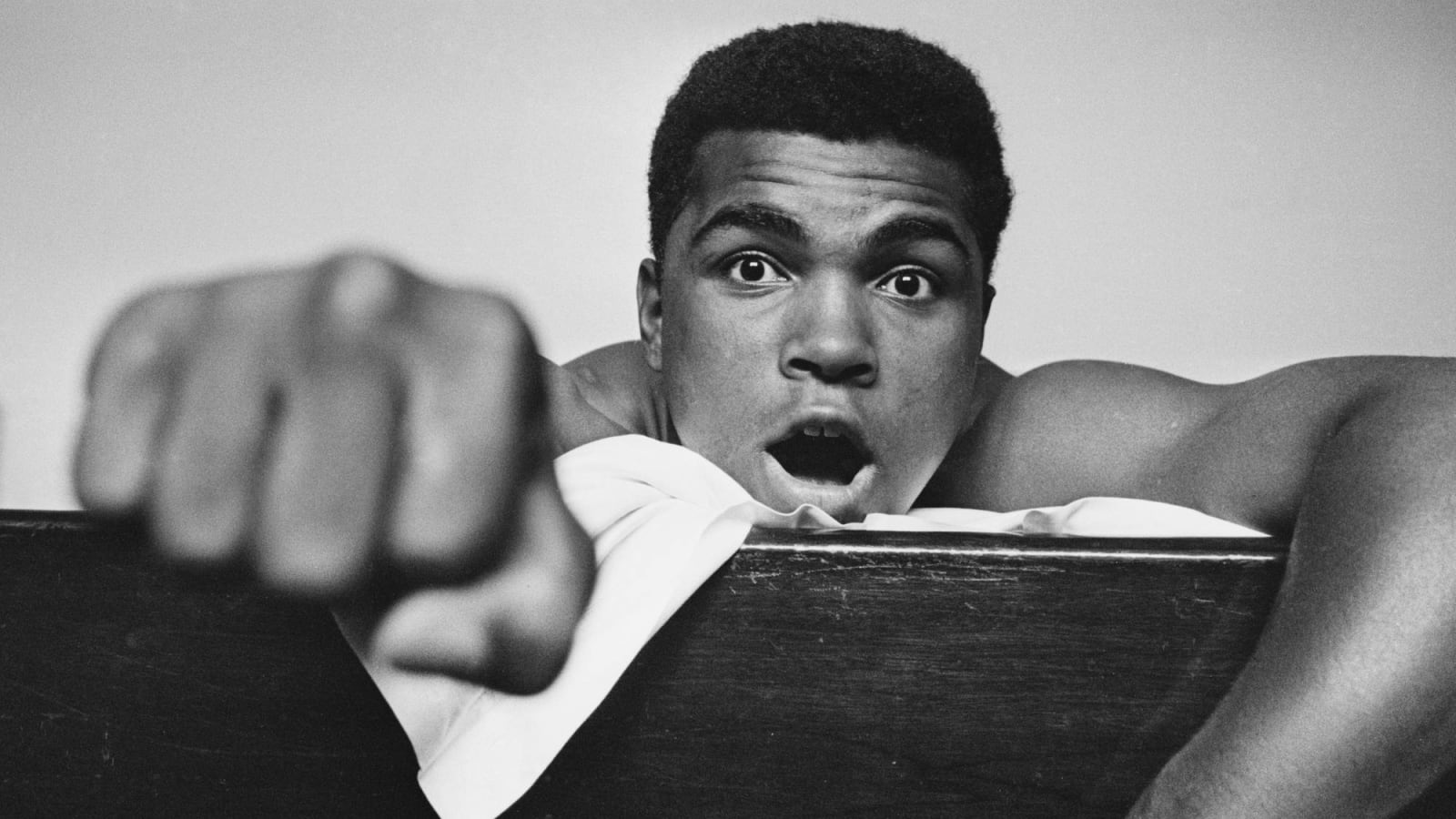
 +
+
